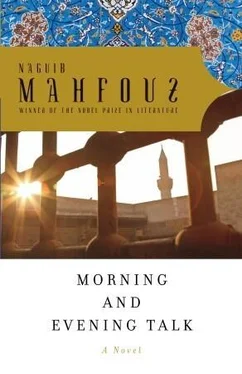“I dreamed you were beckoning me,” he said.
She smiled weakly.
“A voice from the Unknown told me the time has come for us to marry,” he continued. He promptly stood up and left. He returned home and told his mother, “I want to marry. Propose to Bahiga on my behalf.”
Radia told herself that the saints had all married and produced children. When Labib came to visit she told him the news. Labib consulted his cousins Amer and Hamid, and they all agreed Qasim was capable of bearing the burden of a family; the matter rested with Bahiga. Amazingly, Bahiga consented. Some said it was desperation, others said it was the old love. Either way, she was married to him as soon as the old house had been rejuvenated with new furniture. The wedding took place in near silence because of the gloom that reigned during the war; it was celebrated with antiaircraft fire. Years went by without children. Then, one day, Bahiga gave birth to her only son, al-Naqshabandi. He was handsome, like his uncle Labib, and extremely healthy and intelligent. He graduated as an engineer the year of the Setback and, shortly before the 1970s, was sent on a delegation to West Germany. The situation in his country was a burden on his personal well-being so he decided to emigrate. He took an important post at a steel manufacturer after obtaining his doctorate, married a German girl, and settled in Germany for good. Bahiga was deeply saddened while Qasim, who was never sad, bade him farewell with his heart but did not shed a tear.
Qadri Amer Amr
He was born and grew up in the house in Bayn al-Ganayin, the middle son of Amer and Iffat. From childhood he shone in play, industry, and imagination. From childhood too, he was kindled by reading and interested in public life and, unlike his two brothers, was to find he sided with the Marxists. He was passionate about art and literature, despite a gift for science, and laid the foundations for his private library when still in the first year of secondary school. He was a near image of his father, though taller and more robust, and naturally rash, which got him into difficulty. How great was Amer’s surprise when his son was arrested amid a group of Marxists. The man rushed to his father-in-law, Abd al-Azim Pasha, who took steps to have Qadri released on the pretext of youth. The pasha was nevertheless alarmed. “How did such a boy emerge from your house?” he asked Amer and Iffat.
“We haven’t been lax in raising them, but others have sneaked into their lives and corrupted them,” Amer replied timidly.
Qadri entered the faculty of engineering with his name on the security forces’ blacklist. Halim warned his sister the situation could jeopardize his future, and Hamid did the same with his brother Amer. Qadri was repeatedly arrested and released while an engineering student. He was at one time drawn to Shazli, his aunt Matariya’s son, because of their shared culture. But he found Shazli agnostic, the antithesis of his own rational Sufism, so he lost patience and moved on. When he graduated as an engineer he shunned the civil service and worked in the engineering office of a retired teacher of his. He was a competent engineer but his reputation was marred by his politics. His mother was keen that he marry — to sort him out, on the one hand, and to compensate her loss in the case of Shakir, on the other. For his part, he welcomed the idea. She wanted one of his uncle Lutfi Pasha’s daughters for him but did not find the enthusiasm she had hoped for and guessed it was because of his bad reputation. Her anxiety was compounded when neighbors rejected him because they doubted his piety and, consequently, the validity of the marriage. Qadri grew angry with the idea of marriage, just as he was with the bourgeoisie in general. He began to believe his uncles Ghassan and Halim were wise to forsake it.
By the July Revolution his political activism had ceased, but his ideology and friends were the same and the cloud shrouding his reputation had not dissipated. He made palpable progress in his career and it looked set to continue, but then he was sent to prison for the third time. His father appealed to some important officers who had been former students of his. They indulged him and Qadri was released. When the revolution became linked with the Eastern Bloc he inclined toward it and began to see dimensions he had not seen before. Perhaps it was this that made the national catastrophe of June 5 easier for him to bear; he saw it as a clear beginning to securing Soviet influence in Egypt and a step closer to total revolution when the time was ripe. Perhaps this was what made him greet the victory of October 6 with an exasperation he could not conceal. He expended all his logic and learning in negating its meaning and portraying it as a charade. He said to himself: Victory for the bourgeoisie equals victory for reactionism! It was for this reason he opposed Sadat the moment his political strategy became clear and why he detested him both in life and in death, despite the wealth that unexpectedly came his way in the days of the infitah policy. He was one of the flood of men sentenced in September 1981. He was freed with the rest a few days before his father died to resume his successful job and frustrated hopes.

Labib Surur Aziz
HE WAS SURUR AND ZAYNAB’S FIRST CHILD. He had a radiant, handsome face, which resembled his mother’s, and a slender body, below average in height, which seemed designed for a girl. Amazingly, he was calm and composed from childhood, as though he had been born fully mature. Playing for him consisted in standing outside the front door watching the world go by; or following the movements of his cousin Qasim, who was a few years older than him, as he got up to mischief like others his age; or walking around the square cracking almonds. Radia would call him over and say affectionately, “Sensible boy!”
She would also say of him, “The father is an idiot and the mother is a fool, so where did the brains come from?”
When he was just four years old, encouraged by his composure and avoidance of childish mischief, Surur Effendi sent him to Qur’an school. He thought it would not be a waste of time if he spent a year or two there without understanding or grasping anything. But in those two years he acquired enough knowledge to satisfy the shaykh. “Your nephew, Labib, is an amazing boy. You must start him at primary school,” the shaykh said to Labib‘s uncle, Amr Effendi. In those days no one advanced to primary school below the age of eight or nine, so Labib‘s father presented him for the entrance exam without taking it seriously and his success came as a surprise. His studies began when he was only six and he progressed with success year after year, causing astonishment around the family. Even more astonishing was the way he applied himself to his homework without encouragement or incentives, or anyone’s help, until he obtained the primary school certificate aged only ten. His age and talent enabled him to enter one of the king’s special schools free of charge, and he progressed through secondary school with similar success. As a teenager, he resisted the temptations he encountered around family or in the street, obeying his mother’s warnings and deliberately spurning whatever might impede his industry and uprightness. Thus, he obtained the baccalaureate at the age of sixteen. The teachers college was the preferred and appropriate option in the family’s circumstances, but the ambitious young man announced he wanted to go to law school.
“It’s the school for leaders!” muttered Surur, worried but hopeful.
“Let’s get Abd al-Azim’s advice,” said Amr.
Читать дальше













